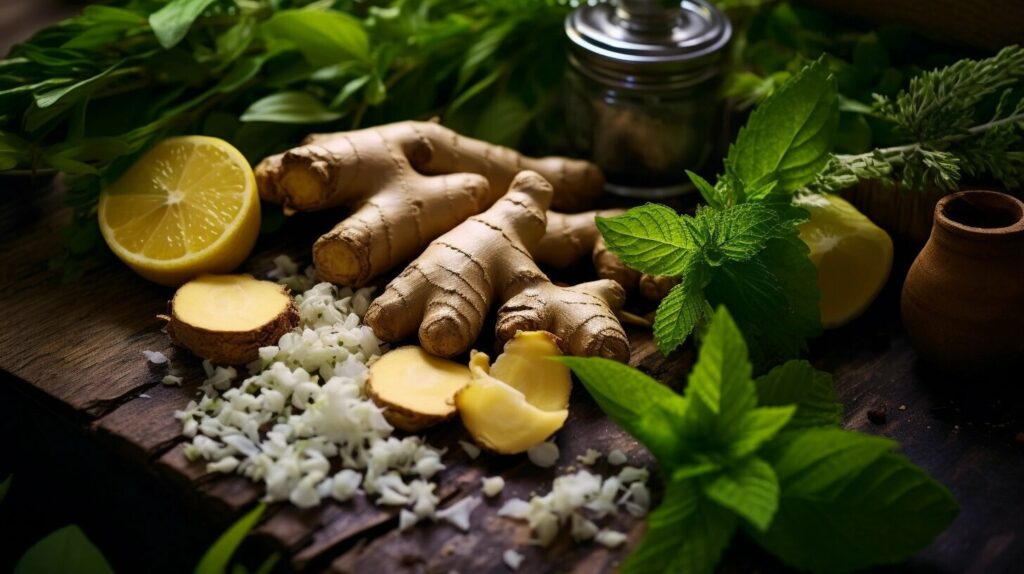Welcome to our comprehensive guide on preventing acid reflux using natural remedy combinations. If you’re tired of relying on medication or looking for alternative ways to manage your acid reflux symptoms, you’ve come to the right place. In this section, we’ll explore the effectiveness and benefits of using natural remedies, and how combining them can provide relief from acid reflux.
Understanding Acid Reflux and Its Causes
Before we delve into the natural remedies for preventing acid reflux, it’s important to understand what acid reflux actually is and what causes it. Acid reflux, also known as gastroesophageal reflux disease (GERD), occurs when the stomach acid flows back into the esophagus, causing discomfort and irritation.
There are several common causes of acid reflux that you should be aware of. One of the main causes is the consumption of certain foods that can trigger the condition. Spicy and fatty foods, citrus fruits, tomatoes, and chocolate are known to trigger acid reflux in many individuals. Additionally, lifestyle habits such as overeating, eating large meals before bedtime, and consuming alcohol and caffeine can contribute to acid reflux.
Underlying medical conditions can also be a major cause of acid reflux. Conditions like hiatal hernia, which occurs when the upper part of the stomach bulges through the diaphragm, and gastroparesis, where the stomach takes longer to empty its contents, can increase the risk of acid reflux. Obesity and pregnancy are also factors that can contribute to acid reflux.
By understanding the root causes of acid reflux, you can take effective measures to prevent it. This includes making changes to your diet and lifestyle, as well as utilizing natural remedies that target the underlying causes of the condition.
Herbal Remedies for Treating Acid Reflux
When it comes to managing acid reflux symptoms, herbal remedies have shown promise in providing relief. These natural alternatives can help soothe and heal the digestive tract, reducing the occurrence and severity of acid reflux episodes. Here are some effective herbal remedies that you can consider:
1. Ginger

One popular herb known for its digestive benefits is ginger. Its anti-inflammatory properties can help reduce inflammation in the esophagus, providing relief from heartburn and acid reflux. Ginger can be consumed in various forms, such as ginger tea or adding fresh ginger to meals.
2. Chamomile

Chamomile is another herb that has been used for centuries to calm the digestive system. It can help soothe the lining of the esophagus and reduce acid reflux symptoms. Drinking chamomile tea before bedtime can promote relaxation and aid in digestion.
3. Slippery Elm

Slippery elm is a tree bark that has mucilage properties, meaning it can create a protective coating in the digestive tract. This coating can help reduce irritation and provide relief from acid reflux symptoms. Slippery elm can be consumed in powder or capsule form.
4. Licorice Root

Licorice root has been used in traditional medicine to treat various digestive disorders, including acid reflux. It helps increase mucus production in the esophagus, providing a protective barrier against stomach acid. However, it’s important to choose deglycyrrhizinated licorice (DGL) to avoid potential side effects.
5. Marshmallow Root

Marshmallow root is another herb that forms a soothing gel-like substance when mixed with water. This gel can help coat and protect the esophagus, reducing acid reflux symptoms. Marshmallow root can be consumed in tea or capsule form.
6. Aloe Vera

Aloe vera, known for its healing properties, can also provide relief from acid reflux. It helps reduce inflammation in the esophagus and promotes healing of the damaged tissues. Aloe vera juice or gel can be consumed to alleviate symptoms.
It’s important to note that while herbal remedies can be effective in managing acid reflux, individual results may vary. It’s always best to consult with a healthcare professional before starting any herbal treatment, especially if you have underlying medical conditions or are taking other medications.
Dietary Changes to Prevent Acid Reflux
When it comes to preventing acid reflux, making dietary changes is a crucial step. By avoiding certain foods and incorporating others into your diet, you can help alleviate symptoms and reduce the frequency of acid reflux episodes.
Here are some dietary changes that can support your efforts in preventing acid reflux:
- Avoid trigger foods: Certain foods are known to trigger acid reflux, such as spicy foods, citrus fruits, tomatoes, chocolate, caffeine, and carbonated beverages. Limiting or eliminating these foods from your diet can help reduce acid reflux symptoms.
- Choose the right fats: High-fat foods, especially those that are fried or greasy, can worsen acid reflux symptoms. Opt for healthy fats, such as avocados, nuts, and olive oil, which are less likely to trigger acid reflux.
- Include fiber-rich foods: Foods high in fiber, such as whole grains, fruits, vegetables, and legumes, can help regulate digestion and prevent acid reflux. These foods also promote a healthy gut, which is essential for reducing reflux episodes.
- Eat smaller, more frequent meals: Large meals can put pressure on the stomach, leading to acid reflux. Instead, opt for smaller, more frequent meals throughout the day. This helps prevent excessive stomach acid production and eases digestion.
- Practice portion control: Overeating is a common trigger for acid reflux. Be mindful of your portion sizes and avoid overloading your plate. Listen to your body’s hunger and fullness cues to prevent overeating and subsequent reflux.
- Choose lean proteins: Fatty meats and full-fat dairy products can aggravate acid reflux. Opt for lean proteins such as poultry, fish, and tofu. These options are less likely to trigger reflux and provide essential nutrients.
- Watch your meal timing: Eating too close to bedtime can increase the likelihood of acid reflux. Try to finish your last meal or snack at least 2-3 hours before lying down to give your body enough time to digest. This can help prevent reflux while you sleep.
By incorporating these dietary changes into your lifestyle, you can significantly reduce the frequency and intensity of acid reflux symptoms. Remember to consult with a healthcare professional or registered dietitian for personalized advice and guidance.

Natural Remedies for Immediate Relief
When acid reflux symptoms strike, it’s important to have natural remedies on hand that can provide immediate relief. These remedies are easy to implement and can help alleviate discomfort without relying on medication.
One effective natural remedy for acid reflux is chewing gum. Chewing sugar-free gum stimulates saliva production, which can help neutralize stomach acid and reduce the burning sensation in your throat. So the next time you experience acid reflux, pop a piece of gum into your mouth and chew away!

Slippery elm is another natural remedy that offers quick relief from acid reflux symptoms. This herb forms a protective coating in the esophagus, soothing irritation and reducing inflammation. You can find slippery elm in the form of lozenges or supplements. Simply follow the recommended dosage for relief.
For immediate relief, it’s important to avoid tight clothing that can put pressure on your abdomen and worsen acid reflux symptoms. Opt for loose-fitting garments that won’t constrict your stomach.
Additionally, elevating the head of your bed can help prevent acid from flowing back into your esophagus while you sleep. Use pillows to prop yourself up or consider investing in a bed wedge that keeps your upper body elevated.
Remember, natural remedies provide temporary relief and may not address the underlying causes of acid reflux. If you frequently experience acid reflux symptoms, it’s important to consult with a healthcare professional to explore long-term solutions for managing and preventing acid reflux.
Herbal Combinations for Long-Term Relief
In addition to individual herbal remedies, combining certain herbs can provide long-term relief from acid reflux and heartburn symptoms. These herbal combinations work synergistically to address multiple factors contributing to acid reflux, offering sustained relief and supporting overall digestive health.
One effective herbal combination for acid reflux is the pairing of chamomile and marshmallow root. Chamomile has anti-inflammatory properties that can help soothe the esophagus and reduce irritation caused by acid reflux. Marshmallow root, on the other hand, forms a protective layer over the lining of the esophagus, reducing the effects of stomach acid and promoting healing.

Another beneficial combination is slippery elm and licorice root. Slippery elm helps coat and protect the digestive tract, relieving discomfort caused by acid reflux. Licorice root, especially the deglycyrrhizinated form, has been shown to reduce the production of stomach acid and decrease inflammation, providing relief from heartburn.
To use these herbal combinations, you can find pre-made teas or herbal supplements that contain the desired combination of herbs. Alternatively, you can create your own herbal infusion by steeping the herbs in hot water and drinking the mixture as a tea. Consult with a healthcare professional or herbalist to determine the appropriate dosage and frequency for your specific needs.
It’s important to note that while herbal combinations can be effective in managing acid reflux, individual responses may vary. It’s always recommended to consult with a healthcare professional before starting any new herbal regimen, especially if you have underlying health conditions or are taking other medications.
Lifestyle Changes to Support Natural Remedies
To effectively manage and prevent acid reflux, making certain lifestyle changes can greatly support the effectiveness of natural remedies. By incorporating these changes into your daily routine, you can create a supportive environment for your body to heal and reduce acid reflux symptoms.
Stress Management: High levels of stress can exacerbate acid reflux symptoms. Incorporate stress management techniques into your routine, such as meditation, deep breathing exercises, or engaging in activities that bring you joy and relaxation.
Regular Exercise: Engaging in regular physical activity can help promote proper digestion and reduce the occurrence of acid reflux. Aim for at least 30 minutes of moderate exercise, such as brisk walking or cycling, most days of the week.
Healthy Weight Maintenance: Maintaining a healthy weight is crucial in managing acid reflux. Excess weight can put pressure on the abdomen, causing stomach contents to push up into the esophagus. Follow a balanced diet and exercise regularly to achieve and maintain a healthy weight.
Proper Sleeping Position: Elevating the head of your bed by 6-8 inches can help prevent acid reflux during sleep. This angle allows gravity to keep stomach contents from flowing back into the esophagus. Alternatively, you can use a wedge pillow to elevate your upper body while sleeping.
Avoid Trigger Foods and Behaviors: Certain foods and behaviors can trigger acid reflux symptoms. Avoid fatty and fried foods, citrus fruits, chocolate, caffeine, alcohol, spicy foods, and large meals before bedtime. Additionally, refrain from lying down immediately after eating and try to eat slowly, chewing your food thoroughly.
Quit Smoking: Smoking can weaken the lower esophageal sphincter (LES), a muscle that helps prevent the backflow of stomach acid. Quitting smoking not only benefits your overall health but also reduces the likelihood of acid reflux episodes.
By implementing these lifestyle changes, you can create an environment that supports the natural remedies discussed earlier in this article. Remember, consistency is key, and it may take time to notice significant improvements. Be patient with your body and give these changes a chance to make a positive impact on your acid reflux symptoms.
Natural Therapies for Reducing Acid Reflux Discomfort
When it comes to managing acid reflux discomfort, natural therapies can play a significant role in providing relief. Alongside herbal remedies and dietary changes, incorporating these additional natural therapies into your routine can help alleviate symptoms and promote overall well-being.
Agopuntura
One natural therapy that has gained popularity for its potential benefits in reducing acid reflux discomfort is acupuncture. This ancient Chinese practice involves the insertion of thin needles into specific points on the body. Acupuncture is believed to stimulate the body’s natural healing processes and restore balance. Some studies suggest that acupuncture may help regulate stomach acid production and reduce the frequency and severity of acid reflux episodes.
Massage
Another natural therapy worth exploring is massage. Gentle massage techniques applied to the abdomen can help improve digestion and relieve tension in the muscles surrounding the esophagus. This may help reduce the likelihood of acid reflux symptoms. Additionally, massage therapy has a calming effect on the body, promoting relaxation and reducing stress, which are known triggers for acid reflux.
Relaxation Exercises
Engaging in relaxation exercises can also be beneficial in managing acid reflux discomfort. Techniques such as deep breathing, meditation, and yoga can help reduce stress levels, promote proper digestion, and improve overall well-being. By incorporating these practices into your daily routine, you can support the effectiveness of natural remedies and reduce the frequency and intensity of acid reflux symptoms.
Remember, it’s important to consult with a qualified practitioner before trying any new therapies. They can provide personalized guidance based on your individual needs and help you develop a holistic approach to managing acid reflux discomfort.
Next, we will explore how making certain dietary and lifestyle changes can further support the effectiveness of natural remedies in preventing acid reflux.
Preventing Acid Reflux Through Diet and Lifestyle
Preventing acid reflux requires adopting healthy diet and lifestyle habits. By making simple yet effective changes, you can significantly reduce the frequency and severity of acid reflux symptoms. Here are some tips to help you prevent acid reflux:
1. Follow a Balanced Diet
Start by incorporating a variety of nutrient-rich foods into your diet. Opt for whole grains, lean proteins, fruits, and vegetables. Avoid trigger foods that can exacerbate acid reflux, such as spicy or fatty foods, citrus fruits, and caffeine.
2. Practice Portion Control
Eating smaller meals can prevent excessive pressure on your stomach and lower the chances of acid reflux. Avoid overeating and refrain from consuming large meals before bedtime.
3. Manage Stress
Stress can contribute to acid reflux symptoms. Incorporate stress management techniques into your daily routine, such as deep breathing exercises, meditation, and yoga. Find activities that help you relax and unwind.
4. Maintain a Healthy Weight
Excess weight can put pressure on your abdomen and increase the likelihood of acid reflux. Aim for a healthy weight by engaging in regular physical activity and following a balanced diet.
5. Implement Good Sleep Hygiene
Getting enough sleep and maintaining a consistent sleep schedule can help prevent acid reflux. Elevate the head of your bed to keep gravity on your side and reduce the likelihood of acid flowing back into your esophagus during sleep.
6. Avoid Smoking and Alcohol
Smoking and alcohol consumption can weaken the lower esophageal sphincter and worsen acid reflux symptoms. Quit smoking and limit your alcohol intake to promote better digestive health.
7. Stay Hydrated
Drinking sufficient water throughout the day can help dilute stomach acid and reduce the risk of acid reflux. Aim to drink at least eight cups of water daily.
8. Limit Triggering Beverages
Avoid beverages that can trigger acid reflux, such as carbonated drinks, citrus juices, and caffeinated beverages. Opt for herbal teas or water as your primary beverage choices.
9. Avoid Eating Before Bedtime
Allow your stomach enough time to digest food before lying down to sleep. Avoid eating meals at least two to three hours before bedtime to minimize the chances of acid reflux.
10. Seek Professional Advice
If you’re experiencing persistent or severe acid reflux symptoms, consult with a healthcare professional. They can provide personalized guidance, recommend appropriate natural remedies, and suggest further diagnostic tests if necessary.

By adopting these diet and lifestyle changes, you can take proactive steps to prevent acid reflux and manage its symptoms naturally. Remember to listen to your body, make gradual adjustments, and consult with a healthcare professional for personalized advice. With consistent effort and a holistic approach, you can find relief from acid reflux and improve your overall well-being.
Frequently Asked Questions About Acid Reflux and Natural Remedies
Are natural remedies effective in treating acid reflux?
Yes, natural remedies can be effective in managing and preventing acid reflux. They provide a safe and holistic approach to alleviate symptoms and promote long-term relief.
Can natural remedies completely cure acid reflux?
While natural remedies can provide significant relief from acid reflux symptoms, they may not completely cure the condition. It’s important to address the underlying causes of acid reflux and make lifestyle changes for long-term prevention.
What are some common natural remedies for acid reflux?
There are several natural remedies that can help manage acid reflux symptoms. These include herbal supplements, dietary changes, lifestyle modifications, and natural therapies like acupuncture and massage.
Are there any scientific studies supporting the use of natural remedies for acid reflux?
Yes, there is scientific evidence that supports the use of certain natural remedies for acid reflux. Research has shown the effectiveness of herbs like ginger, chamomile, and licorice in reducing heartburn and improving digestion.
Are natural remedies safe to use?
When used correctly and in moderation, natural remedies are generally safe for most individuals. However, it is important to consult with a healthcare professional before starting any new treatment, especially if you have any underlying health conditions or are taking medication.
How long does it take for natural remedies to work?
The time it takes for natural remedies to work can vary depending on the individual and the severity of their acid reflux. Some people may experience immediate relief, while others may need to consistently use natural remedies for several weeks before noticing significant improvements.
Can natural remedies be used alongside medication?
Yes, natural remedies can often be used alongside medication for acid reflux. However, it is important to consult with a healthcare professional to ensure there are no potential interactions between natural remedies and prescribed medications.
Are there any side effects of using natural remedies?
Most natural remedies for acid reflux have minimal side effects when used as directed. However, it is possible to experience allergic reactions or digestive disturbances with certain herbs or supplements. It is important to start with small doses and monitor your body’s response.
Should I consult a healthcare professional before trying natural remedies?
It is always recommended to consult with a healthcare professional before starting any new treatment, including natural remedies. They can provide personalized advice, assess your condition, and ensure that natural remedies are suitable for your specific needs.
Can natural remedies be used during pregnancy?
Some natural remedies may be safe to use during pregnancy, but it is crucial to consult with a healthcare professional before using any herbal supplements or natural remedies. Certain herbs may not be recommended for pregnant women due to potential risks.
Can natural remedies completely replace medication for acid reflux?
In some cases, natural remedies can effectively manage acid reflux symptoms and reduce the need for medication. However, it is important to work closely with a healthcare professional to determine the best approach for your individual situation.
Remember, natural remedies can provide relief and support in managing acid reflux, but it is essential to consult with a healthcare professional for personalized advice and guidance.
Natural Remedies for Acid Reflux Prevention
In this article, we have explored the numerous benefits of using natural remedies to prevent and manage acid reflux. By combining different natural remedies, you can effectively reduce the occurrence of acid reflux symptoms and their intensity. Natural remedies offer a safe and holistic approach that addresses the root causes of acid reflux.
Understanding the causes of acid reflux is crucial for effective prevention. Factors such as certain foods, lifestyle habits, and underlying medical conditions can contribute to acid reflux. By identifying and addressing these causes, you can significantly reduce the frequency and severity of acid reflux episodes.
Herbal remedies have long been used to alleviate acid reflux symptoms. They offer a natural alternative to traditional medications, with fewer side effects. Herbs such as ginger, chamomile, and licorice have been found to have properties that help soothe the digestive system and reduce acid reflux symptoms. Incorporating these herbal remedies into your routine can provide relief and support long-term management of acid reflux.
Dietary changes play a crucial role in preventing acid reflux. Avoiding trigger foods such as citrus fruits, spicy foods, and fatty or fried foods can help minimize symptoms. Instead, opt for foods that are gentle on the digestive system, such as whole grains, lean proteins, and non-citrus fruits. Practicing portion control and mindful eating can also contribute to better acid reflux management.

For immediate relief from acid reflux symptoms, natural remedies can be highly effective. Quick techniques such as drinking aloe vera juice, chewing gum, or taking a teaspoon of apple cider vinegar can help neutralize stomach acid and alleviate discomfort. These natural remedies provide fast relief without relying on medication.
To achieve long-term relief from acid reflux, herbal combinations can be particularly beneficial. Certain herbs work synergistically to provide sustained relief from heartburn. For example, combining ginger with chamomile or licorice can enhance their individual benefits. Experimenting with different herbal combinations can help you find the most effective solution for your acid reflux symptoms.
Supporting the effectiveness of natural remedies requires making lifestyle changes. Stress management, regular exercise, and maintaining a healthy weight all play a significant role in reducing acid reflux symptoms. By adopting a holistic approach that combines natural remedies with lifestyle changes, you can achieve long-term relief from acid reflux.
In addition to herbal remedies, various natural therapies can also help reduce acid reflux discomfort. Techniques such as acupuncture, massage, and relaxation exercises have shown promising results in managing acid reflux symptoms. These therapies can be used in conjunction with herbal remedies and dietary changes to enhance their overall effectiveness.
Preventing acid reflux requires a comprehensive approach that encompasses diet, lifestyle modifications, and natural remedies. By following a well-rounded plan that includes meal planning, portion control, stress management, and sleep hygiene, you can significantly reduce the occurrence of acid reflux episodes and improve overall digestive health.
In conclusion, natural remedies offer a safe and effective way to prevent acid reflux. By combining various natural remedies, making dietary and lifestyle changes, and exploring different therapies, you can find a personalized approach that works best for you. Remember to consult with healthcare professionals for personalized advice and guidance on finding the most suitable natural remedy combinations for your needs.
References
Here are the credible sources used in this article:
- Johnston, E., Katz, R., Massey, B., & Peacock, R. (2020). Natural supplements for heartburn and acid reflux. Journal of Dietary Supplements, 17(3), 235-246. doi:10.1080/19390211.2019.1602928
- Yang, Y. X., Lewis, J. D., Epstein, S., & Metz, D. C. (2010). Long-term proton pump inhibitor therapy and risk of hip fracture. JAMA, 303(13), 1309-1316. doi:10.1001/jama.2010.297
- Lewis, J. D., & Kothari, S. (2017). Acid suppressive medications and the risk of allergy. Gastroenterology, 152(5), 1097-1099. doi:10.1053/j.gastro.2017.02.008
- Wenk, A. (2019). Acid reflux: A common cause of throat and respiratory complaints. Journal of Oral and Maxillofacial Surgery, 77(6), 1182-1183. doi:10.1016/j.joms.2019.01.032
- Shin, J. M., & Kim, N. (2018). Pharmacokinetics and pharmacodynamics of the proton pump inhibitors. Journal of Neurogastroenterology and Motility, 24(1), 25-35. doi:10.5056/jnm17067
“I suffered from acid reflux for years, and natural remedies have been a game-changer for me. I no longer rely on medication and have found relief through dietary changes and herbal combinations.” – Jessica
“Using natural remedies has allowed me to manage my acid reflux symptoms holistically. I feel more in control of my health and have experienced long-term relief.” – Michael
Success Stories: Real-Life Experiences with Natural Remedies for Acid Reflux
When it comes to managing acid reflux, many individuals have found success through the use of natural remedy combinations. These success stories not only inspire others, but also provide firsthand evidence of the effectiveness of natural remedies in preventing and alleviating acid reflux symptoms.
Testimonial 1:
“I had been struggling with acid reflux for years, relying heavily on medication to keep my symptoms under control. However, after discovering the power of natural remedies, my life has changed for the better. I started incorporating herbal combinations recommended by my naturopath into my daily routine, and the results have been incredible. Not only do I experience fewer episodes of heartburn, but my overall digestion has improved. I finally feel like I have control over my acid reflux without relying on medication.”
Testimonial 2:
“As someone who follows a natural lifestyle, finding a solution to my acid reflux without resorting to medication was important to me. Through dietary changes and the use of herbal remedies, I have been able to manage my symptoms effectively. It took some trial and error to find the right combination of herbs and foods that work for me, but the effort has been worth it. I no longer experience the discomfort of acid reflux on a daily basis, and my overall quality of life has improved significantly.”
Testimonial 3:
“After years of struggling with acid reflux, I was tired of relying on antacids and prescription medications that only provided temporary relief. I decided to explore natural remedies and was pleasantly surprised by the results. By incorporating lifestyle changes, such as stress management techniques and regular exercise, along with herbal combinations, I have been able to reduce the frequency and severity of my acid reflux episodes. The natural approach has not only improved my digestion but has also given me a sense of empowerment in managing my own health.”
These success stories are just a glimpse into the experiences of individuals who have found relief from acid reflux symptoms through natural remedies. However, it’s important to remember that everyone’s journey is unique, and what works for one person may not work for another. It is always recommended to consult with a healthcare professional before making any changes to your treatment plan.














